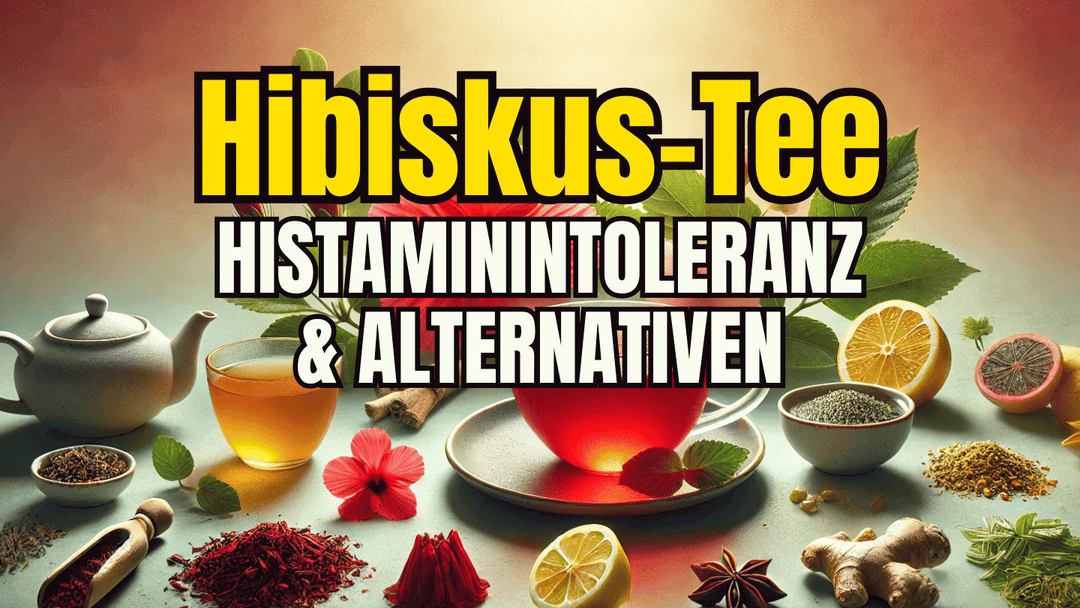Hibiscus tea: effects, side effects & preparation

Introduction
Hibiscus tea is not only a refreshing drink, but also a true superfood with positive health effects. Its fruity, tangy flavor and deep red color make it a real eye-catcher – but its health benefits are far more exciting. Numerous studies show that it can lower blood pressure, boost metabolism , and protect cells with its powerful antioxidants . It's no wonder, then, that hibiscus tea is becoming increasingly popular!
But how healthy is it really? And are there any side effects you should be aware of? In this article, you'll learn all about its effects , its health benefits , and how to prepare it properly. We'll also look at whether it really helps with weight loss and whether it's suitable for everyone.
Table of contents
- What is hibiscus tea?
- Hibiscus Tea Effect – The Most Important Benefits
- Hibiscus tea side effects – what you should be aware of
- Hibiscus tea preparation – the perfect brewing time
- Buy hibiscus tea – organic, loose or tea bags?
- Conclusion
1. What is hibiscus tea?
Hibiscus tea is a fruity, tart herbal/fruit tea made from the dried flower calyxes. Known for its deep red color and refreshing taste, it is popular worldwide—both hot and cold as a refreshing iced tea. In addition to its unique aroma, hibiscus tea is valued for its health benefits , including its anti-hypertensive, anti-inflammatory , and antioxidant properties .
Tea has a long tradition as a medicinal beverage, particularly in African, Asian, and Latin American countries. There, it is not only appreciated as a refreshing beverage, but also used in traditional medicine to support heart health and digestion . In Mexico, it is known as "Flor de Jamaica," in Egypt as "Karkadeh," and in West Africa as "Bissap."
1.1 Origin & varieties of hibiscus
The hibiscus plant grows primarily in tropical and subtropical regions, including Africa, Asia , and Central America. It is rich in anthocyanins , which have antioxidant properties and are responsible for its red color .
- Hibiscus sabdariffa: The most common variety for tea, known for its fruity flavor and health benefits.
- Hibiscus rosa-sinensis: Often used as an ornamental plant, not suitable for tea use.
- Hibiscus acetosella: Also known as “false roselle hibiscus,” it is used regionally in tea blends.
1.2. What nutrients does hibiscus tea contain?
Hibiscus tea is rich in valuable nutrients that offer numerous health benefits . Of particular note are its high levels of antioxidants, vitamin C , and polyphenols, which contribute to cellular health . The Journal of Functional Foods has identified the following key nutrients:
- Anthocyanins: Responsible for the red color, act as powerful antioxidants.
- Vitamin C: Strengthens the immune system and supports skin health.
- Polyphenols: Help reduce inflammation and protect the cardiovascular system.
- Flavonoids: Support blood vessels and can lower blood pressure.
- Calcium & Magnesium: Important for healthy bones and muscles.
2. Hibiscus Tea Effect – The Most Important Benefits
The tea is prized not only for its intense flavor, but also for its numerous health benefits. Thanks to its antioxidant, anti-inflammatory , and antihypertensive properties, it has been used in natural medicine for centuries. Many recent studies demonstrate that hibiscus can have positive effects on the cardiovascular system, metabolism , and the immune system .
Below you will learn about the scientifically proven effects the tea can have on your body and why it is a valuable addition to a healthy diet.

2.1. Hibiscus tea effect on blood pressure
One of the most well-known benefits of hibiscus tea is its blood pressure-lowering effect. We have a detailed article on this topic, " Hibiscus Tea & Blood Pressure: Naturally Lowers Blood Pressure? " It provides detailed information about its effects on blood pressure.
Several studies show that the flowers can help lower systolic and diastolic blood pressure . The flavonoids and polyphenols they contain have a vasodilating effect and can thus contribute to blood pressure regulation .
Another clinical study has also shown that just three cups a day can measurably lower blood pressure – comparable to mild blood pressure-lowering medication.
2.2. Does hibiscus tea help with weight loss?
Hibiscus tea is often referred to as a natural fat burner because it can boost fat burning and reduce carbohydrate absorption in the intestines. Studies with clear results have also been published in this regard. For example, the School of Health Sciences, University of Manchester , shows that hibiscus extract can help lower BMI (body mass index) and reduce fat deposits in the abdominal area .
In addition, the tea has a diuretic effect, which helps flush excess water from the body. This can lead to visible weight loss in the short term. Combined with a healthy diet and sufficient exercise , hibiscus tea can therefore be a useful aid in weight loss . Learn exactly how hibiscus tea can help you lose weight, what daily amounts are recommended by science, and what to look for when purchasing it in our detailed article: Does hibiscus tea help you lose weight?
2.3. Hibiscus Tea & Immune System – Strengthened by Antioxidants
Hibiscus is an excellent source of vitamin C and antioxidants, which boost the immune system and protect the body from oxidative stress. The Journal of Functional Foods cites the extremely high levels of anthocyanins, which can neutralize free radicals and prevent cell damage, as the primary reason for this effect .
Especially during the cold season, the tea can be a valuable supplement to prevent colds and support the immune system . Its anti-inflammatory properties also help reduce inflammatory reactions in the body .
You can find out why hibiscus flower tea is so effective against colds and flu in our detailed article: Hibiscus tea for colds: Effects & Studies
2.4. Hibiscus Tea & Histamine – Tolerance & Alternatives
Hibiscus has many health benefits, but its tolerability in people with histamine intolerance is controversial. While some people with histamine problems tolerate hibiscus well, others report intolerance. It appears that certain phytochemicals can influence histamine release.
If you are sensitive to histamine, you should start with small amounts or switch to alternatives such as lemongrass tea .
In our detailed article on hibiscus tea and histamine, you'll learn in much more detail what problems can occur, why they occur, what science says about it, and what alternatives and recipes are available.
3. Hibiscus tea side effects – What you should consider

As with any herbal beverage, hibiscus tea also has potential side effects that you should be aware of. People with low blood pressure, pregnant women , and those with histamine intolerance should be especially careful. In addition to their strong blood pressure-lowering effect, a study has shown that the flowers can also affect certain enzymes in the body at higher doses.
3.1 During pregnancy and breastfeeding
Research suggests that hibiscus tea may have labor-inducing properties because it affects estrogen levels . This could increase the risk of premature birth .
For detailed information, see our article: Hibiscus Tea During Pregnancy & Breastfeeding – Safe or Not?
3.2. Does hibiscus tea lower blood pressure too much?
Those who already have low blood pressure or are taking blood pressure medication should be cautious. Studies have shown that consuming hibiscus tea can significantly lower systolic and diastolic blood pressure .
So if you are prone to dizziness or circulatory problems, you should only drink hibiscus tea in moderation .
You can find more information in our detailed article on the effect of hibiscus on blood pressure .
4. Hibiscus tea preparation – The perfect brewing time
Proper preparation of hibiscus tea is crucial to maximize its full flavor and health benefits.
Depending on the brewing time, water temperature, and preparation method, the flavor varies from mildly fruity to intensely sour. Furthermore, the preparation method influences which secondary plant compounds develop in the tea. According to a study , the valuable anthocyanins are best extracted at temperatures between 80 and 95°C .
4.1. Enjoy hot & cold
The tea can be consumed both hot and cold. While hot brewed tea develops an intense, bitter flavor , cold brewed hibiscus tea is milder and fruitier.
- Hot preparation: Pour 1-2 teaspoons of hibiscus flowers with 250 ml of hot water (90-95°C) and let it steep for 5-10 minutes.
- Cold infusion: Pour 2 tablespoons of hibiscus flowers with 1 liter of cold water and let it steep in the refrigerator for at least 6-12 hours.
4.2. Hibiscus Tea Recipes – Classic & Creative

In addition to the classic preparation, there are many ways to enhance the flavor of hibiscus tea . Combinations with ginger , lemon, lemongrass , guayusa , or mint are particularly popular.
- Hibiscus Lemon Tea: Refine hot hibiscus tea with a squeeze of fresh lemon juice and honey. According to a study of hibiscus flowers, the added vitamin C helps the body absorb the polyphenols better.
- Hibiscus iced tea with mint: Cold hibiscus tea with fresh mint and ice cubes.
- Hibiscus-ginger tea: Boil a small piece of fresh ginger, or our particularly intense and dried Amazon ginger tea , with the hibiscus flowers and sweeten with agave syrup.
- Hibiscus Guayusa Tea: E.g., as a ready-made blend in our shop or as your own blend for an awakening energizer without heart palpitations.
5. Buy hibiscus tea – organic, loose or tea bags?
When purchasing hibiscus tea, there are significant differences in quality, origin , and ingredients. Whether loose flowers, tea bags, or organic quality – each option has its advantages and disadvantages. It's especially important to pay attention to the tea's origin, as most products are contaminated with pesticides or harmful substances.
Organic products, and especially organic products from permaculture, contain the most nutrients and vitamins. This difference compared to conventional foods is due to the fact that plants from permaculture, especially from permaculture, grow more vigorously and produce more antibodies. These antibodies, in turn, are often the very active substances that are beneficial to us humans.
You can learn more about the comparison of organic, permaculture, and conventional farming in our article: " What does organic farming mean? "
5.1. Loose tea bags vs. tea bags – Which is better?
The flowers are available in two main forms: loose flowers or tea bags. While loose hibiscus flowers often have a more intense color and contain more active ingredients , tea bags are more convenient for quick preparation. One study shows that loose tea contains up to 40% more polyphenols than commercially packaged tea bags.
- Loose hibiscus flowers: Higher quality, more active ingredients, but somewhat more complex to prepare.
- Tea bags: Quick and easy to prepare, but often finely ground and with fewer antioxidants.
5.2. Why organic permaculture is the better choice
When buying food, you should look for organic quality . Conventionally grown hibiscus plants can be contaminated with pesticides that dissolve in the infusion. That conventional food It has now been proven by many studies that they contain residues of pesticides.
Organic tea is grown more sustainably, contains higher amounts of secondary plant compounds , and preserves the original flavor of the flower. Therefore, when making your purchase, you should always pay attention to the manufacturer's transparent information about its origin. The organic seal alone is no longer sufficient these days. It almost exclusively regulates the fertilization method, but says nothing about the cultivation method. Thus, conventional products with an organic seal can still be responsible for the deforestation of vast areas of rainforest . Only permaculture cultivation prevents this. You can learn more about our " Chakra Seal " in the linked blog post.
5.3. Where can you buy high-quality hibiscus tea?
Hibiscus tea is available in many supermarkets, drugstores, and online shops. However, quality varies depending on the supplier. You can find particularly high-quality varieties directly from the manufacturer.
- Supermarkets (e.g. Rewe, Edeka, Kaufland): Often only tea bags, limited selection – inferior and environmentally damaging quality.
- Drugstores (DM, Rossmann): Organic option, but from monocultures, mostly only tea bags.
- Online shops & specialty suppliers: Best selection of loose flowers and organic quality.
- Directly from the manufacturer: At GUYA, we offer you hibiscus flowers from permaculture and direct, transparently traceable trade.
6. Conclusion
Hibiscus tea is far more than just a refreshing beverage. With its numerous health benefits —from lowering blood pressure to supporting the immune system —it's a valuable addition to a healthy diet. Its high concentration of antioxidants, flavonoids , and polyphenols protects cells from oxidative stress and contributes to overall health. Regular consumption of hibiscus tea can even strengthen the cardiovascular system and stimulate the metabolism.
Whether as a hot infusion or a refreshing iced tea, the versatile preparation options make these flowers a true all-rounder. Furthermore, the organic quality from permaculture makes them a healthy and sustainable choice. Those who value high quality and prefer organic hibiscus benefit not only from the better flavor but also from a higher content of valuable plant compounds. You can find our organic hibiscus from permaculture here .


















